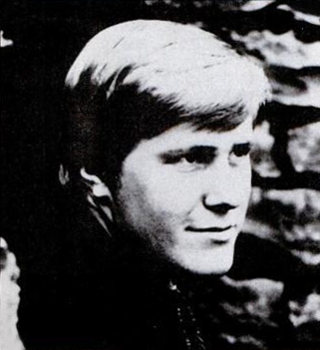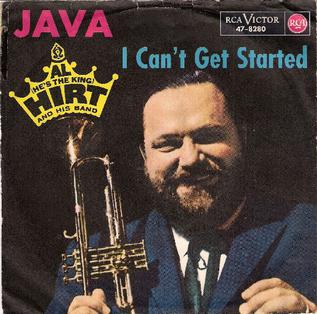Related Research Articles

Skeeter Davis was an American country music singer and songwriter who sang crossover pop music songs including 1962's "The End of the World". She started out as part of the Davis Sisters as a teenager in the late 1940s, eventually landing on RCA Victor. In the late 1950s, she became a solo star.

"It's Only Make Believe" is a song written by drummer Jack Nance and Mississippi-born singer Conway Twitty, while they were touring across Ontario, Canada in 1958. Twitty was a relatively unknown rock n' roll singer at the time, and this song was his first hit, reaching No. 1 on the Billboard chart in November 1958 for two weeks.
"You're Nobody till Somebody Loves You" is a popular song written by Russ Morgan, Larry Stock, and James Cavanaugh and published in 1944. The song was first recorded by Morgan and was a hit for him in 1946, reaching the No. 14 spot in the charts. The best known version was Dean Martin's, which was released in 1960 and reissued in 1964.
"He'll Have to Go" is an American country and pop hit recorded on October 15, 1959, by Jim Reeves. The song, released in the fall of 1959, went on to become a hit in both genres early in 1960.
"City Lights" is an American country music song written by Bill Anderson on August 27, 1957. He recorded it on a small Texas label called TNT Records in early 1958 to little acclaim. The song was first cut by Anderson in 1957 at the campus of the University of Georgia. In June 1958, Ray Price recorded it and his version hit number 1 on the Billboard Hot Country Songs singles chart in August 1958. Mickey Gilley's version also hit number 1 in June 1975.

John Wesley Ryles is an American country music artist. Ryles recorded a string of hit country songs, beginning in 1968 when he was still a teenager, and continuing through the 1980s. He no longer records as a headline artist but remains active in the music industry as a session musician.
"Please Help Me, I'm Falling" is a 1960 song written by Don Robertson and Hal Blair and first recorded by Hank Locklin. The single was Locklin's most successful recording and was his second number one on the country charts. "Please Help Me, I'm Falling" spent 14 weeks at the top spot and spent nine months on the country chart and crossed over to the Hot 100 peaking at number eight.
"Take These Chains from My Heart" is a song by Hank Williams. It was written by Fred Rose and Hy Heath and was recorded at Williams' final recording session on September 23, 1952, in Nashville. The song has been widely praised; Williams' biographer Colin Escott deems it "perhaps the best song [Rose] ever presented to Hank...It was one of the very few songs that sounded somewhat similar to a Hank Williams song." Williams is backed by Tommy Jackson (fiddle), Don Helms, Chet Atkins, Jack Shook, and Floyd "Lightnin'" Chance (bass). In the wake of Williams' death on New Year's Day, 1953, the song shot to No. 1, his final chart-topping hit for MGM Records. Like "Your Cheatin' Heart," the song's theme of despair, so vividly articulated by Williams' typically impassioned singing, reinforced the image of Hank as a tortured, mythic figure.
"After the Fire Is Gone" is a song written by L. E. White, and recorded by American country music artists Loretta Lynn and Conway Twitty as a duet. It was released in January 1971 as the only single from the LP We Only Make Believe. "After the Fire Is Gone" was the first number one on the U.S. country chart for Lynn and Twitty as a duo. It spent two weeks at number one and a total of 14 weeks on the chart. On the Billboard Hot 100, the single peaked at number 56. It also won a Grammy for Grammy Award for Best Country Performance by a Duo or Group with Vocal.
"Ribbon of Darkness" is a song written by Gordon Lightfoot that was released in 1965 as a single by Marty Robbins. The song was Robbins' eleventh number one on the U.S. country singles chart, where it spent one week at the top and a total of nineteen weeks on the chart.
"Fifteen Years Ago" is a song written by Raymond Smith, and recorded by American country music artist Conway Twitty. It was released in September 1970 as the first single and title track from the album Fifteen Years Ago. The song was Twitty's fifth number one on the U.S. country singles chart. The single stayed at number one for a single week and spent a total of 16 weeks on the chart.
"You've Never Been This Far Before" is a song written and recorded by American country music artist Conway Twitty. It was released in July 1973 as the second single and title track from the album You've Never Been This Far Before.
"This Time I've Hurt Her More Than She Loves Me" is a song written by Earl Thomas Conley and Mary Larkin and recorded by American country music artist Conway Twitty. It was released in October 1975 as the first single from the album This Time I've Hurt Her More. The song was Twitty's fifteenth number one country single as a solo artist. The single stayed at number one for a single week and spent a total of ten weeks on the country chart.
"I May Never Get to Heaven'" is a song written by Bill Anderson and Buddy Killen, and was originally recorded by Don Gibson in 1960 and released on the B-side of "Just One Time",
"Tight Fittin' Jeans" is a song written by Michael Huffman, and recorded by American country music artist Conway Twitty. It was released in June 1981 as the first single from the album Mr. T. The song was Twitty's 26th number one on the country chart. The single stayed at number one for one week and spent a total of 10 weeks on the country chart.
"Ain't She Somethin' Else" is a song recorded by American country music artist Eddy Raven. It was released in November 1974 as the first single from the album This Is Eddy Raven. The song reached number 46 on the Billboard Hot Country Singles & Tracks chart. The song was written by Bill Rice and Jerry Foster.

Here's the Answer is the second studio album by American country artist Skeeter Davis. The album was released in January 1961 on RCA Victor Records and was produced by Chet Atkins. The album consisted of cover versions of hit singles by country artists and answer songs to the hits.

"Java" is an instrumental adaptation from a 1958 LP of piano compositions, The Wild Sounds of New Orleans, by Tousan, also known as New Orleans producer/songwriter Allen Toussaint. As was the case of the rest of Toussaint's LP, "Java" was composed in studio, primarily by Toussaint.
"Making Believe" is a country music song written by Jimmy Work. Kitty Wells recorded a chart-topping version in 1955. The song is on many lists of all-time greatest country music songs and has been covered by scores of artists over the past fifty years, including Thorleifs, Bob Dylan, Johnny Cash, Don Gibson, Roy Acuff, Lefty Frizzell, Wanda Jackson, Connie Francis, Ray Charles, Anita Carter, Dolly Parton, Emmylou Harris, Merle Haggard, Ernest Tubb, Skeeter Davis, The Haden Triplets, Social Distortion and Volbeat. The song is occasionally called "Makin' Believe".
"My Last Date " is a song written by Boudleaux Bryant, Floyd Cramer, and Skeeter Davis. In 1960, Skeeter Davis recorded and released the song as a single for RCA Victor. The song was an answer song to Floyd Cramer's country pop crossover hit that year titled "Last Date". Skeeter Speaks the first two lines in the Bridge section of the song.
References
- ↑ Whitburn, Joel (2004). The Billboard Book Of Top 40 Country Hits: 1944-2006, Second edition. Record Research. p. 91.
- ↑ "The Hot 100 Chart". Billboard .
- ↑ "1050 CHUM - CHUM Charts". Archived from the original on July 21, 2006. Retrieved 2016-10-16. Chart No. 187, November 28, 1960. CHUM.
- ↑ "Lever Hit Parade" 23-Feb-1961, Flavour of New Zealand. Retrieved October 15, 2016.
- ↑ "Floyd Cramer Chart History (Hot 100)". Billboard.
- ↑ Lawrence Welk & His Orchestra - Chart History - The Hot 100, Billboard.com. Retrieved October 15, 2016.
- ↑ Al Hirt, Cotton Candy Retrieved April 7, 2013.
- ↑ The Soul Runners, "Last Date" single release Retrieved July 1, 2016.
- ↑ Whitburn, Joel (2004). The Billboard Book Of Top 40 Country Hits: 1944-2006, Second edition. Record Research. p. 361.
- ↑ Whitburn, Joel (2004). The Billboard Book Of Top 40 Country Hits: 1944-2006, Second edition. Record Research. p. 153.